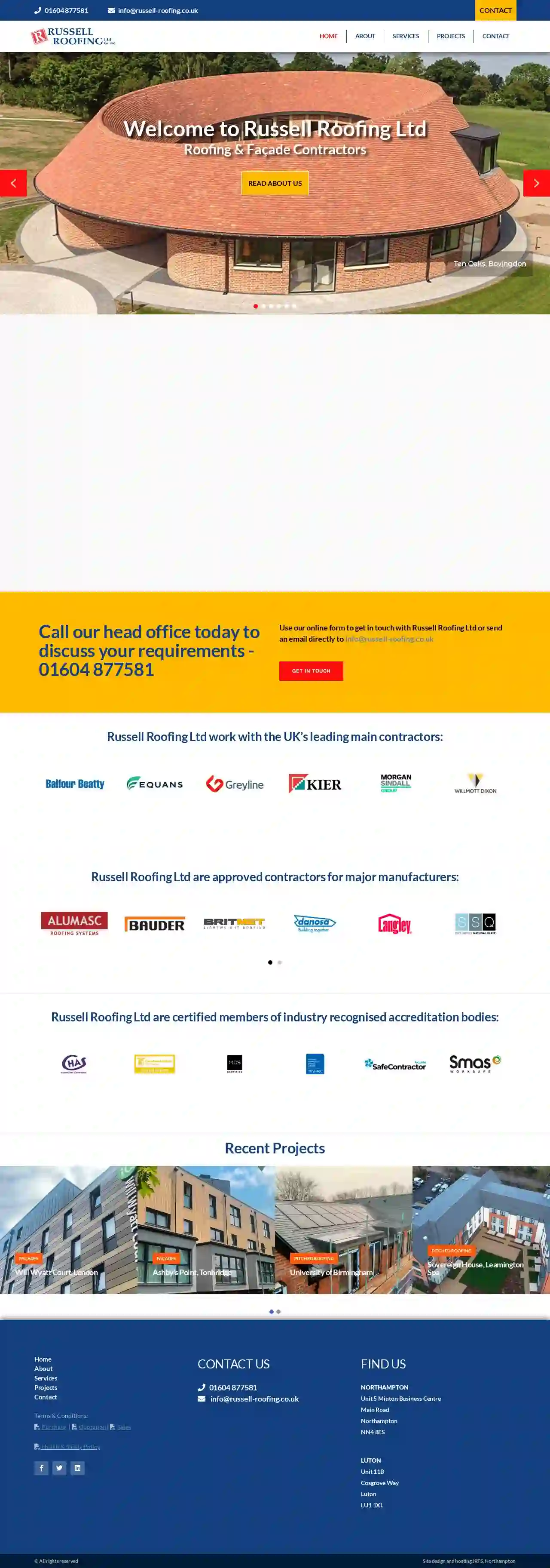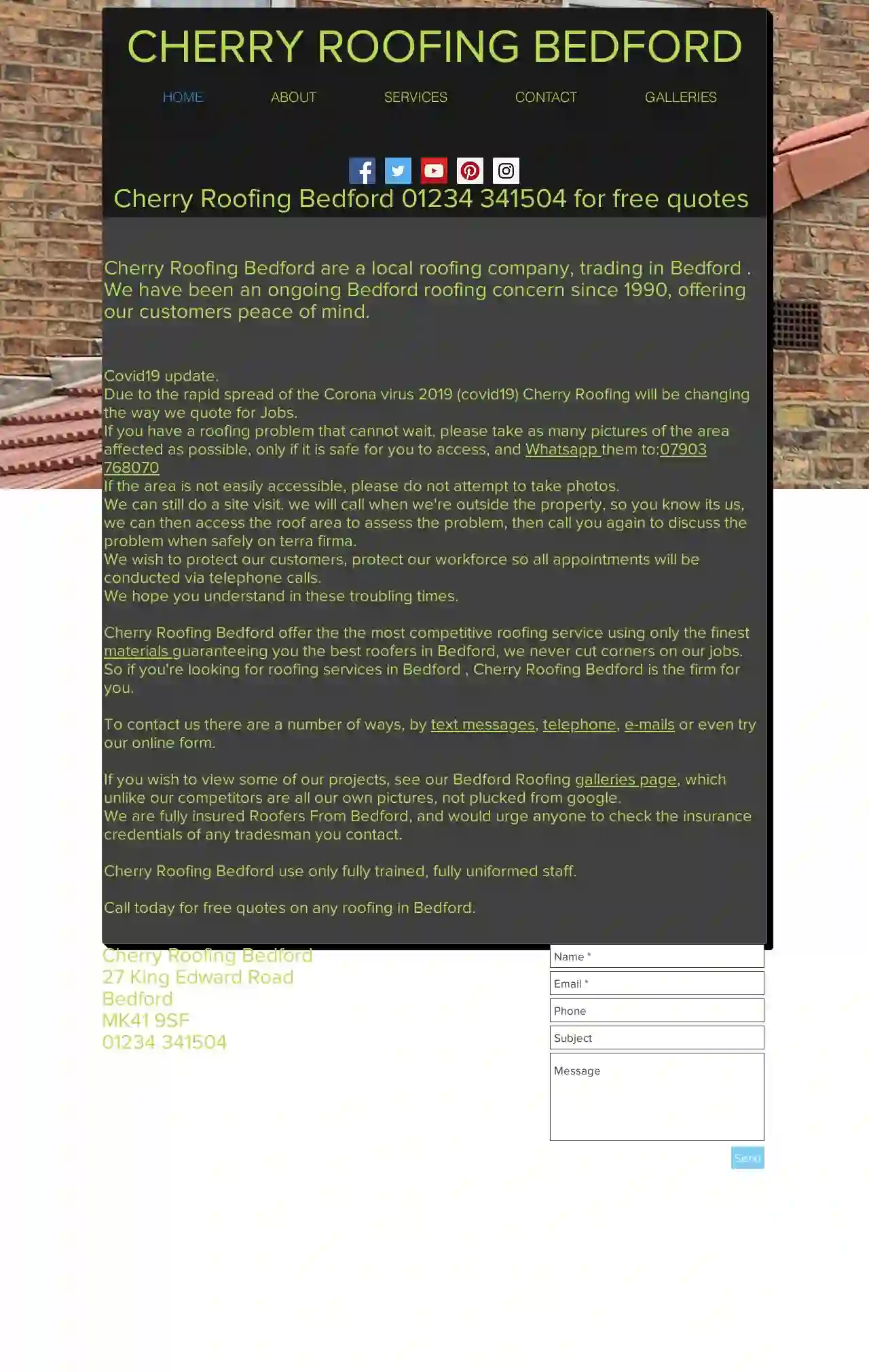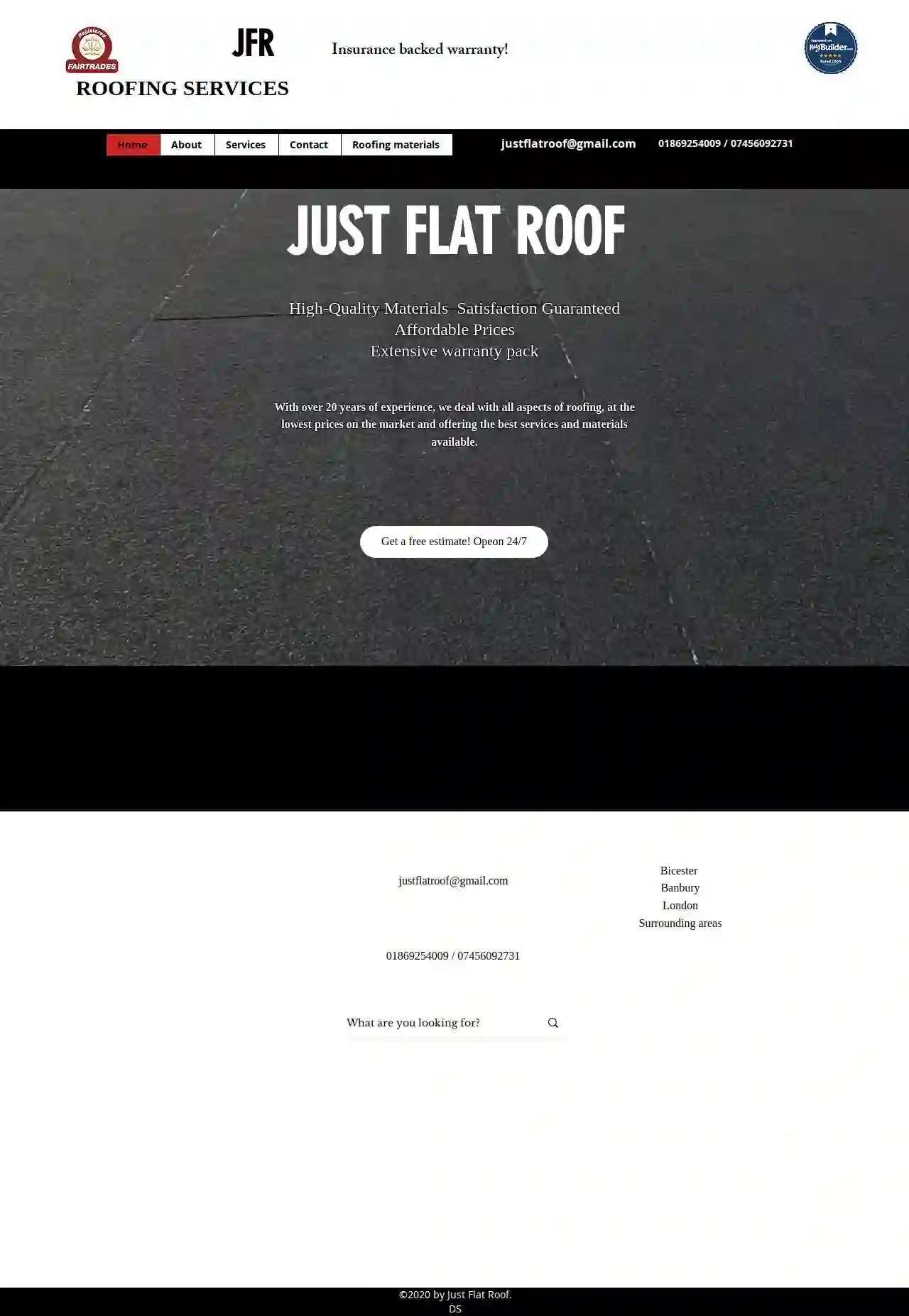Roofing Companies Great Linford
Top 10 Roofing Contractor in Great Linford
Get multiple Roofing Services quotes for your project today! Compare profiles, reviews, accreditations, portfolio, etc... and choose the best service.

Russell Roofing Ltd
4.33 reviewsMain Road, Unit 5 Minton Business Centre, Northampton, NN4 8ES, GBFormed in 1962 Russell Roofing Ltd is one of the UK’s leading roofing, cladding and building façade contractors. Considered by many to set the benchmark for design, quality and service the Directors and senior management team boast over 150 years industry experience, working together with clients to value engineer the optimal solution. Russell Roofing Ltd combine intellectual excellence with professional acumen to deliver award winning projects having won the “Best Use of Concrete & Clay Tiles for a Domestic Project” at the 2022 RCI Pitched Roofing Awards and “Best Refurbishment Project” at the 2023 RCI Façade Awards UK. Partnering with some of the UK’s leading suppliers we provide cost effective solutions and believe that while profit is important establishing an environment of value and trust is fundamental to the development of long-term client relationships, essential for future growth and success. We offer a comprehensive range of roofing and façade services for new build and refurbishment projects. Our portfolio of building envelope works includes pitched roofing, flat roofing, engineered façades, leadworks, roofline, rainwater and solar. Established over 60 years ago, we provide clients building envelope solutions across the South of England.
- Services
- Why Us?
- Accreditations
- Gallery
Get Quote
Cherry Roofing Bedford
3.915 reviews27 King Edward Road, Bedford, MK41 9SF, GBCherry Roofing Bedford are a local roofing company, trading in Bedford. We have been an ongoing Bedford roofing concern since 1990, offering our customers peace of mind. Covid19 update. Due to the rapid spread of the Corona virus 2019 (covid19) Cherry Roofing will be changing the way we quote for Jobs. If you have a roofing problem that cannot wait, please take as many pictures of the area affected as possible, only if it is safe for you to access, and Whatsapp them to: 07903 768070. If the area is not easily accessible, please do not attempt to take photos. We can still do a site visit. We will call when we're outside the property, so you know it's us, we can then access the roof area to assess the problem, then call you again to discuss the problem when safely on terra firma. We wish to protect our customers, protect our workforce so all appointments will be conducted via telephone calls. We hope you understand in these troubling times. Cherry Roofing Bedford offer the most competitive roofing service using only the finest materials guaranteeing you the best roofers in Bedford, we never cut corners on our jobs. So if you're looking for roofing services in Bedford, Cherry Roofing Bedford is the firm for you.
- Services
- Why Us?
- Gallery
Get Quote
Just Flat Roof Ltd- Banbury
513 reviewsGBWith over 20 years of experience, Just Flat Roof deals with all aspects of roofing at the lowest prices on the market, offering the best services and materials available. We are committed to providing high-quality materials and customer satisfaction, backed by an insurance-backed warranty. Get a free estimate today!
- Services
- Why Us?
- Gallery
Get Quote
LD Roofing Services Ltd
4.966 reviewsWellingborough, Northamptonshire, 108A, Leyland Trading Estate, NN8 1RS, GBLD Roofing Services Ltd is a highly recommended roofing company based in Northampton, serving all aspects of roofing across Northamptonshire, Buckinghamshire, and Bedfordshire. With over 25 years of industry experience, we provide both commercial and residential roofing solutions. We pride ourselves on our fully qualified, approved, and registered roofers who are CHAS, SMAS Worksafe Contractor, and CSCS registered. We offer flexible and low-cost finance options to make our services accessible to everyone. Our commitment to quality is reflected in our workmanship guarantee and warranties of various lengths, ensuring customer satisfaction. We use only the finest manufacturers and suppliers to guarantee premium finishes that exceed expectations. Whether you need a new roof, repairs, or maintenance, our team is here to help. Contact us today for a free quote and consultation.
- Services
- Why Us?
- Accreditations
- Our Team
- Testimonials
- Gallery
Get Quote
LPO Roofing Kempston
GBAt LPO Roofing Kempston, we are passionate about delivering a service that will exceed our client’s expectations. We do this by offering the best possible customer care and ensuring our roofing work is of the highest quality. Our roofers have decades of combined experience and have tackled every imaginable type of roofing repair and installation, so you can be sure you’re in safe hands with us. This may be why we are becoming known as the best roofing contractor in Kempston, Bedfordshire, and the surroundings. We always work on the principle of keeping things simple, and ensure we are providing: Transparent, dependable advice from a local and trustworthy roofer. Roofing solutions that will meet all of your needs, and last for years to come. An honest and reliable service. Fantastic prices in comparison with others on a like-for-like basis. If you want to learn more about our roof repair, maintenance, and installation services, we’d love to hear from you. Please get in touch with us and schedule your free site survey.
- Services
- Why Us?
- Gallery
Get Quote
Kettering Bituminous Products Ltd
4.811 reviews12 Henson Close, Telford Way, Industrial Estate, Kettering, NN16 8PZ, GBKettering Bituminous Products is a well established roofing materials supplier, servicing the flat roofing industry nationwide. Whether you are a professional contractor or taking on a project for yourself, we have a wide range of quality roofing materials to suit your needs. Supplying high quality specialist materials for built up felt roofs and single ply membranes, rest assured you can rely on us with all of your material requirements. We offer a comprehensive range of roofing materials, including flat roof supplies, insulation, felt, bitumen and road surfacing. Need support with a roofing solution? We provide domestic and commercial roofing products from membranes and insulation to a complete roofing solution.
- Services
- Why Us?
- Gallery
Get Quote
Sundon Roofing ltd
510 reviewsGBSundon Roofing Ltd is a reputable roofer based in Luton, dedicated to providing high-quality roofing services for both residential and commercial clients. With years of experience in the industry, their team of skilled roofers is committed to delivering top-notch solutions tailored to meet the unique needs of each customer. They specialize in a wide range of roofing services, including installations, repairs, replacements, and maintenance. Sundon Roofing Ltd takes pride in their commitment to quality craftsmanship and exceptional customer service. They prioritize attention to detail, employing the latest techniques and industry-leading materials to ensure long-lasting and durable roofs. Their team works closely with clients, providing expert advice, transparent communication, and customized solutions to achieve the desired results within budget and timeframe. Whether you need a new roof installation, emergency repairs, gutter cleaning, or chimney maintenance, Sundon Roofing Ltd has the expertise to handle it all.
- Services
- Why Us?
- Our Team
- Testimonials
- Gallery
Get Quote
Impact Roofing & Building Contractors
Higham Ferrers, Rushden, 40 Handcross Way, Northamptonshire, NN10 8AE, GBAt Impact Roofing & Building Contractors Ltd, we take pride in fortifying your home with top-notch roofing solutions. With a commitment to excellence and a team of skilled professionals, we stand as your trusted partner for all things roofing. We strive to offer competitive prices without compromising on the quality of our work, ensuring value for our customers. We take pride in delivering top-notch craftsmanship, ensuring durable and high-quality roofing and building solutions that stand the test of time.
- Services
- Why Us?
- Gallery
Get Quote
Hytile Roofing
55 reviews20A-30 Abington Street, Northampton, NN1 2AJ, GBA 3rd generation roofing Company offering home and business owners competitively priced roofing solutions without any obligation. Our family run team, who have been working in the roofing industry for the last 25 years, welcome all types of roofing enquiries no matter how large or small. We work on all types of properties from modern new builds through to traditional and even listed buildings. Our roofing solutions are offered to all customers in a large area including Northampton, Wellingborough, Upton, Roade, Towcester, Moulton, Weeden Bec, Daventry, Long Buckby, Crick, Dunchurch, Kilsby, Barby, Rugby, Lutterworth and all surrounding areas. Our call outs and quotations are free and come with a 14 day cooling off period, we also carry public liability insurance for your peace of mind. We do not require a deposit before we start working on your property, just speak to a member of our friendly team about your specific roofing requirements and we will quote you accordingly, our quotation will not come with any hidden extras. Our team are highly recommended in your local area because of their great workmanship and reliable roofing service, using only the best materials on the market today. References are available upon request from our team.
- Services
- Why Us?
- Accreditations
- Our Team
- Testimonials
- Gallery
Get Quote
CM Roofing
52 reviewsGBCM Roofing is a family-run roofing company based in Bedford with over twenty years of experience in the roofing trade. We operate throughout Bedfordshire and Hertfordshire, specializing in all types of roofing work for both domestic and commercial markets. Whether it's a few new slates or a full roof replacement, we're here to help. We pride ourselves on our highly qualified team who ensure all work meets the highest standards. Customer satisfaction is our priority, and we offer a specialized roof maintenance service and a tile-matching facility second to none. As a family business, we provide a friendly and reliable service, never using subcontractors. We're committed to building on our excellent reputation, which has grown steadily over the years. We offer a reliable, efficient, and trustworthy service at very affordable prices. All new roofs come with a comprehensive ten-year guarantee, and we operate with full public liability insurance. We understand the importance of providing exceptional service at a competitive price. We're always happy to offer advice to both new and existing customers and provide free quotations for any work required. Our operatives are regularly updated and trained on safe working practices. We are members of a specialist health and safety information and advice organisation, ensuring the safety of our team and the public during our operations. We hold a full comprehensive £2,000,000 hot works public liability insurance.
- Services
- Why Us?
- Testimonials
- Gallery
Get Quote
Over 12,314+ Roofing Businesses in our network
Our roofing experts operate in Great Linford & beyond!
Roofyng.co.uk has curated and vetted Top Roofing Businesses in Great Linford. Find a top & trustworthy contractor today.
Frequently Asked Questions About Roofing Companies
- Leaks or Water Stains: Water stains on ceilings or walls, dripping water, or dampness in the attic.
- Missing, Cracked, or Curled Shingles: Inspect for damaged or missing shingles, especially after a storm.
- Damaged Flashing: Look for rust, corrosion, or gaps in flashing around chimneys, vents, or skylights.
- Sagging or Uneven Rooflines: A sagging roof could indicate structural problems.
- Granule Loss: Excessive granules in gutters suggest aging asphalt shingles.
- Moss or Algae Growth: Can trap moisture and damage roofing materials.
- Ventilation: Soffit vents provide intake ventilation, allowing fresh air to enter the attic and regulate temperature and moisture.
- Aesthetics: It creates a finished look to the roof's underside.
- Pest Control: A properly sealed soffit prevents pests like birds and squirrels from nesting in the attic.
- Regular Inspections: Inspect your roof at least twice a year for signs of damage or wear and tear.
- Gutter Cleaning: Clean gutters and downspouts regularly to prevent clogs and ensure proper drainage.
- Tree Trimming: Trim overhanging branches to avoid damage from falling debris and reduce shade, preventing moss growth.
- Proper Ventilation: Ensure good attic ventilation to regulate temperature and moisture.
- Timely Repairs: Address any damage promptly to prevent escalation.
What are some common signs of roof damage?
What is a soffit, and why is it important for my roof?
How do I prevent roof damage?
How often should I clean my gutters?
What are some common signs of roof damage?
- Leaks or Water Stains: Water stains on ceilings or walls, dripping water, or dampness in the attic.
- Missing, Cracked, or Curled Shingles: Inspect for damaged or missing shingles, especially after a storm.
- Damaged Flashing: Look for rust, corrosion, or gaps in flashing around chimneys, vents, or skylights.
- Sagging or Uneven Rooflines: A sagging roof could indicate structural problems.
- Granule Loss: Excessive granules in gutters suggest aging asphalt shingles.
- Moss or Algae Growth: Can trap moisture and damage roofing materials.
What is a soffit, and why is it important for my roof?
- Ventilation: Soffit vents provide intake ventilation, allowing fresh air to enter the attic and regulate temperature and moisture.
- Aesthetics: It creates a finished look to the roof's underside.
- Pest Control: A properly sealed soffit prevents pests like birds and squirrels from nesting in the attic.
How do I prevent roof damage?
- Regular Inspections: Inspect your roof at least twice a year for signs of damage or wear and tear.
- Gutter Cleaning: Clean gutters and downspouts regularly to prevent clogs and ensure proper drainage.
- Tree Trimming: Trim overhanging branches to avoid damage from falling debris and reduce shade, preventing moss growth.
- Proper Ventilation: Ensure good attic ventilation to regulate temperature and moisture.
- Timely Repairs: Address any damage promptly to prevent escalation.